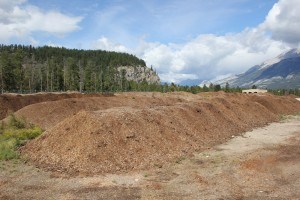
The municipality has agreed to do something about its growing pile of biosolids.
In August, the town’s environmental stewardship coordinator, Janet Cooper told council that space for Jasper’s biosolids was running out after tests revealed the compost it produces is unfit for the park.
Biosolids are organic material removed from Jasper’s wastewater after it is treated. The biosolids are mixed with wood chips at the town’s wastewater treatment plant before being loaded into a dump truck and sent to the transfer station to dry out and cure.
According to Cooper, space at the Jasper Transfer Station, where Jasper’s biosolids are composted has become a critical issue with stockpiles getting larger and larger.
During a council meeting on Aug.16, Cooper asked council to approve spending $15,000 from the environmental stewardship fund to rectify the issue. After some consideration council approved the request, Sept. 6.
“Because we’re taking this from the environmental stewardship fund it’s not money that has to be replaced,” said Cooper, adding that the reserve fund has been untouched and growing for the past few years.
Both the municipality and Parks Canada split costs associated with the environmental stewardship program.
Cooper has already sought out Scott Gamble of Edmonton’s CH2M HILL Canada Limited to provide an assessment of the existing biosolids. According to Gamble, he predicts the scope of work will cost $9,830, excluding taxes.
Coun. Gilbert Wall questioned why Suez North America (formerly United Water), which operates Jasper’s wastewater treatment plant, is not responsible for resolving the issue.
“I know we have to deal with the biosolids issue—that’s a given, but in terms of the responsibility and the costs associated with this I’m not sure who is responsible for what,” Wall said.
Cooper said Gamble will clarify those questions.
“Scott Gamble will clarify what’s being done and who’s doing what,” Cooper said. “I think it’s just gotten a little confusing over the years.”
According to Cooper, the plan will evaluate the town’s entire biosolids operation and come up with short-term solutions as well as a long term strategy to manage the growing problem. The work will include an assessment of the existing stockpiles and the identification of requirements and costs associated with converting the biosolids into a usable compost product. What exactly needs to be done to make that compost usable is unclear at the moment.
“The proposal came in at just under $10,000 and the ask was for $15,000—this gives us a little leeway if something else was to come up,” Cooper said.
“I think it’s a very good use of the environmental stewardship fund and this allows us to have a more sustainable plan for the end use of biosolids.”
During the meeting Mayor Richard Ireland said he’s been asked numerous times by residents if the biosolids and the town’s kitchen waste compost get lumped into the same pile. Cooper said that the two different wastes are processed separately and remain separate.
“Both are still perfectly safe to use anywhere, but they fall under different classes of compost and are brought to different standards,” Cooper said.
Despite the municipality giving the green light, Parks Canada still needs to sign-off on the proposed biosolids management plan before Gamble and his company can move forward.
Kayla Byrne
[email protected]
